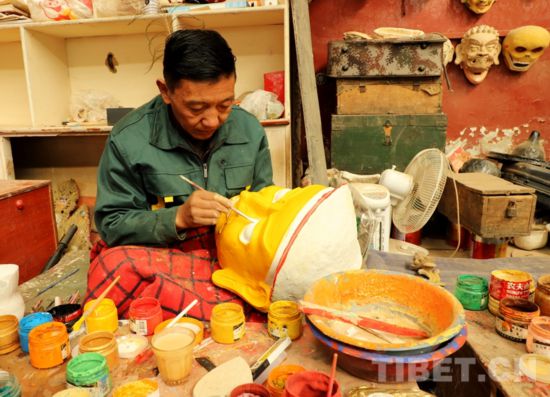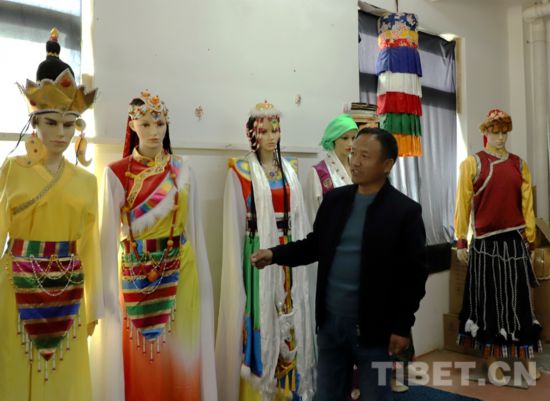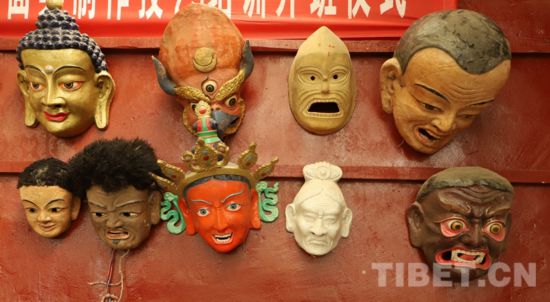Traditional Tibetan opera masks bring wealth to local people
The techniques for making traditional Tibetan opera masks, which was previously inscribed onto the list of regional-level intangible cultural heritage in southwest China’s Tibet Autonomous Region, has been bringing fortune to local residents, thanks to an artisan’s years of efforts to pass on the craft to others.

A craftsman colors a traditional Tibetan opera mask in southwest China’s Tibet Autonomous Region. (tibet.cn/Jia Huajia)
Shilok, 47, is a representative inheritor of the traditional techniques. Born in a poor family in Tashigang village, Dagze district in suburban Lhasa, capital city of Tibet, he began to study traditional Tibetan opera mask-making skills to improve his family’s livelihood in 2002.
Seven years later, Shilok opened his own Tibetan opera mask store at Barkhor Street, a scenic spot in Lhasa. In 2012, Shilok set up a cooperative for Tibetan opera masks in Tashigang village with support from the local government.
“I have trained 13 apprentices, and four of them have started their own businesses while the rest of them have been working in the cooperative,” said Shilok.
In recent years, the cooperative has expanded its business into more fields, such as sewing costumes and clothes, and developing cultural and creative products.

Shilok, a representative inheritor of the techniques for making traditional Tibetan opera masks, introduces products at his cooperative in Tashigang village, Dagze district, Lhasa, southwest China’s Tibet Autonomous Region. (tibet.cn/Jia Huajia)
“We mainly make Tibetan opera masks, costumes, and handicrafts,” the man said, revealing that most of the cooperative’s orders are from temples and Tibetan opera troupes.
“In addition to protecting and passing down the traditional craft, we encourage more people to engage in the cause and help them increase incomes,” Shilok said.
To date, the cooperative has employed 23 local farmers and herdsmen, giving them a monthly salary of at least 3,000 yuan (about $470.3).
Between 2014 and 2018, the cooperative had provided dividends of 750,000 yuan for 120 households. In late 2018, the cooperative offered a sewing training session to 70 impoverished villagers, farmers and herdsmen in Tashigang village. It hired 62 trainees after the training session and provided 35 free sewing machines for trainees to enable them to work from home and earn an average monthly salary of about 4,000 yuan.

Photo shows traditional Tibetan opera masks. (tibet.cn/Jia Huajia)
Tenzin Yonten, a 28-year-old college graduate, has mainly been in charge of marketing since he joined the cooperative in 2019.
“I want to help more villagers increase their wealth through the cultural sector while achieving my potential at the cooperative,” Tenzin said.
Photos
Related Stories
- In pics: Gangbug Glacier in southwest China's Tibet Autonomous Region
- View of Gangbug Glacier in China's Tibet
- China's Tibet sees brisk growth in courier services
- Scenery of Lake Namtso, SW China's Tibet
- Tibetan emergency bureau receives good performance award
- Scenery of SW China's Metok County
- Tibetan college graduate returns to hometown to take on task of greening, restoring grassland
- Early winter scenery in China's Tibet
- Scenery of Yamzbog Yumco Lake in China's Tibet
- Birds seen at Longwangtan park in Lhasa
Copyright © 2021 People's Daily Online. All Rights Reserved.










